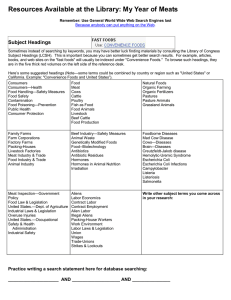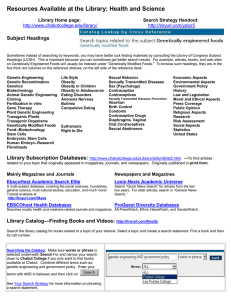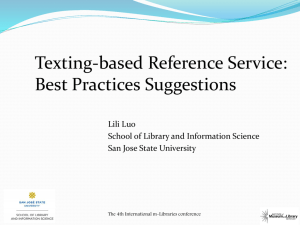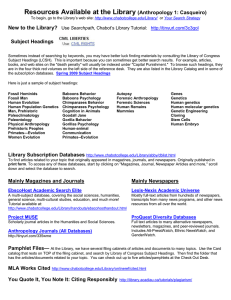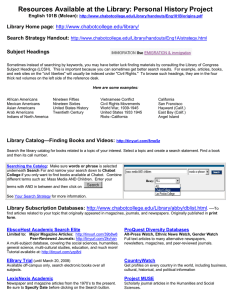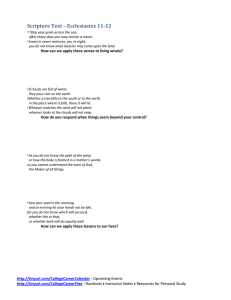Resources Available at the Library: Fast Food Nation Subject Headings
advertisement
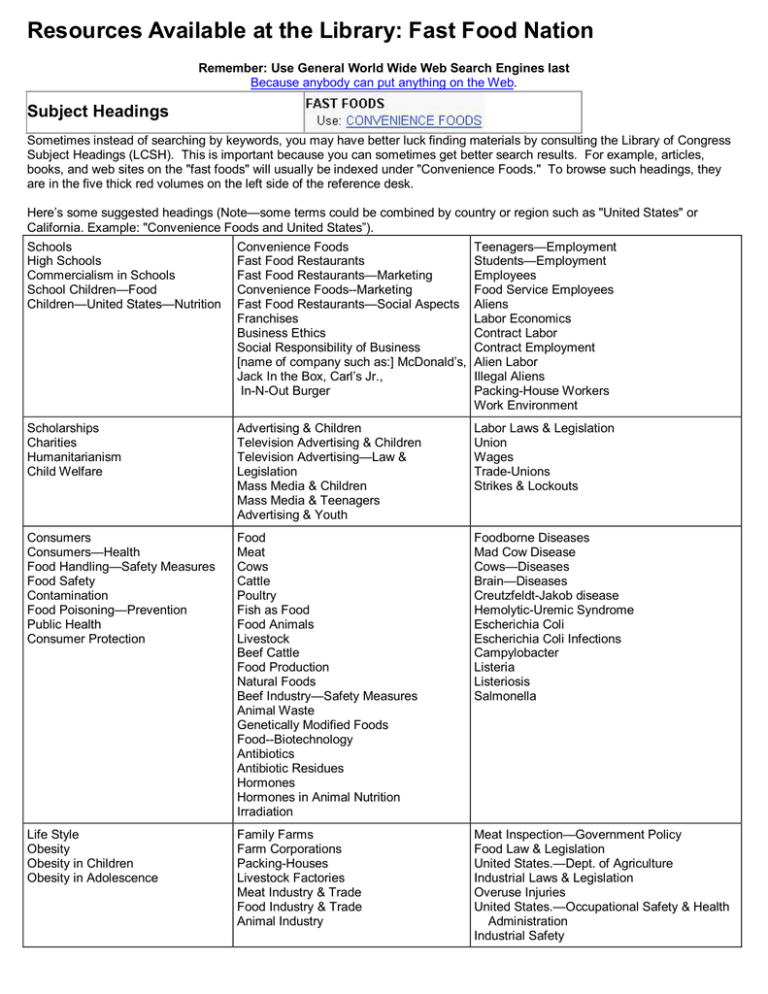
Resources Available at the Library: Fast Food Nation Remember: Use General World Wide Web Search Engines last Because anybody can put anything on the Web. Subject Headings Sometimes instead of searching by keywords, you may have better luck finding materials by consulting the Library of Congress Subject Headings (LCSH). This is important because you can sometimes get better search results. For example, articles, books, and web sites on the "fast foods" will usually be indexed under "Convenience Foods." To browse such headings, they are in the five thick red volumes on the left side of the reference desk. Here’s some suggested headings (Note—some terms could be combined by country or region such as "United States" or California. Example: "Convenience Foods and United States”). Schools High Schools Commercialism in Schools School Children—Food Children—United States—Nutrition Convenience Foods Fast Food Restaurants Fast Food Restaurants—Marketing Convenience Foods­­Marketing Fast Food Restaurants—Social Aspects Franchises Business Ethics Social Responsibility of Business [name of company such as:] McDonald’s, Jack In the Box, Carl’s Jr., In­N­Out Burger Teenagers—Employment Students—Employment Employees Food Service Employees Aliens Labor Economics Contract Labor Contract Employment Alien Labor Illegal Aliens Packing­House Workers Work Environment Scholarships Charities Humanitarianism Child Welfare Advertising & Children Television Advertising & Children Television Advertising—Law & Legislation Mass Media & Children Mass Media & Teenagers Advertising & Youth Labor Laws & Legislation Union Wages Trade­Unions Strikes & Lockouts Consumers Consumers—Health Food Handling—Safety Measures Food Safety Contamination Food Poisoning—Prevention Public Health Consumer Protection Food Meat Cows Cattle Poultry Fish as Food Food Animals Livestock Beef Cattle Food Production Natural Foods Beef Industry—Safety Measures Animal Waste Genetically Modified Foods Food­­Biotechnology Antibiotics Antibiotic Residues Hormones Hormones in Animal Nutrition Irradiation Foodborne Diseases Mad Cow Disease Cows—Diseases Brain—Diseases Creutzfeldt­Jakob disease Hemolytic­Uremic Syndrome Escherichia Coli Escherichia Coli Infections Campylobacter Listeria Listeriosis Salmonella Life Style Obesity Obesity in Children Obesity in Adolescence Family Farms Farm Corporations Packing­Houses Livestock Factories Meat Industry & Trade Food Industry & Trade Animal Industry Meat Inspection—Government Policy Food Law & Legislation United States.—Dept. of Agriculture Industrial Laws & Legislation Overuse Injuries United States.—Occupational Safety & Health Administration Industrial Safety Library Subscription Databases: http://www.chabotcollege.edu/Library/abby/dblist.html. —To find articles related to your topic that originally appeared in magazines, journals, and newspapers. Originally published in print form. For this assignment, the databases that will work best will especially be EbscoHost Academic Search Elite, ProQuest Diversity Databases, and Lexis­Nexis Academic. Mainly Magazines and Journals Mainly Newspapers EbscoHost Full Text Only ProQuest Diverity Databases Search Academic Search Elite and the Military and Government Collection to find articles from journals, magazines, and government reports. Search three databases that feature the alternative presses: Alt­PressWatch, Ethnic NewsWatch, and GenderWatch. Also contains some magazines and peer­ reviewed journals. EbscoHost Academic Search Elite Lexis­Nexis Academic A multi­subject database, covering the social sciences, humanities, general science, multi­cultural studies, education, and much more! Tutorial available at: http://tinyurl.com/acl9l Mostly full­text articles from hundreds of newspapers, transcripts from many news programs, and other news resources from all over the world. Search "Quick News Search" for articles from the last two years. For older articles, search in "General News Search." Reference/Statistical Sources (Books, Databases and Web sites) CQ Researcher Index at Ref. Desk. Reference: H35 E35 FACTS.com Issues & Controversies http://tinyurl.com/6ft8u Statistical Abstract of the United States Reference Desk: HA202 U58 S7 Statistical Resources on the Web http://tinyurl.com/cymw6 The Food Safety Information Handbook Reference: TX 531 R57 2001 Work in America: An Encyclopedia of History, Policy, and Society Reference: HD8066 .W637 2003 Handbook of U.S. Labor Statistics Reference: HD8051 .H36 Employment, Hours, and Earnings Reference Desk: HD8064 .E47 2005 Undocumented Immigrants: An Annotated http://www.library.ca.gov/crb/05/06/05­006.pdf Bibliography Handbook of Eating Disorders and Obesity Reference: RC 552 E18 H362 2004 Infectious Diseases Sourcebook Reference: RA 643 .I6545 2004 Encyclopedia of Food and Culture Reference: GT2850 .E53 2003 Encyclopedia of Associations Reference Desk: HS17 G334 2004 Online Reference Shelf http://www.chabotcollege.edu/Library/onlineref/ Fast Food Facts: Interactive Food Finder http://tinyurl.com/dp7za CountryWatch http://tinyurl.com/6cxcq St. James Encyclopedia of Popular Culture Reference: E169.1 .S764 2000 Encyclopedia of Children, Adolescents, and the Media Reference: HQ784 .M3 E53 2007 Hoover's Handbook of American Business Reference: HF3010 .H66 1998 Hoover's Handbook of World Business Reference: HG4009 .H66 2001 Encyclopedia of American Industries Reference: HC102 .E53 1998 International Directory of Company Histories Reference: HD2721 .I63 Labor Conflict in the United States: An Encyclopedia Reference: HD5324 .L32 1990 West’s Encyclopedia of American Law Reference: KF154 .W47 1998 Dictionary of American History Reference: E174.D52 2003 Encyclopedia of Sociology Reference: HM17 .E5 1992 Web Sites Consumer Interest/Meat Safety Eat Well Guide http://www.eatwellguide.org/index.cfm From the non­profit organization, the Institute for Agriculture and Trade Policy, this web site provides a directory to supermarkets, restaurants, and farm and meat distributors that provide either organic or “all natural” meats. When going to an actual supermarket, keep in mind that you still need to match the listed farm or meat distributor on the list (supermarkets can have meats coming from more than one farm). In addition to the market chains listed in a previous version of this directory, such as Trader Joe’s, Nob Hill, and Whole Foods supermarket chains, PW Markets has since begun selling “all natural” beef (the ones from Meyers, that is) which do not use antibiotics, hormones, or use animal products in the feed. Statements on Antibiotic Use by Major Restaurant Chains http://tinyurl.com/8e865 From the non­profit organization, “Keep Antibiotics Working,” this site asked different restaurant chains to respond to the pending crisis regarding the use of antibiotics used in meats that could seriously affect the health of consumers. The responses are directly from the companies and have not been verified for accuracy. Frontline: Modern Meat http://www.pbs.org/wgbh/pages/frontline/shows/meat/ From Frontline, an in­depth journalistic show on PBS, this site discusses the current controversies involved in the meat production and meat inspection industries. Includes reports, interviews, and statistical facts. National Food Safety Database http://foodsafety.ifas.ufl.edu/indexNFSDB.htm Center for Consumer Freedom http://www.consumerfreedom.com/ This website is supported by restaurants, food companies, and “concerned” consumers (they do not list what restaurants or food companies). Their purpose is to defend the consumer’s rights in their choice of food and criticizes many arguments made on food safety, obesity, and other food­related issues (such as the ones made in Schlosser’s book). Their claim is basically this (quoted directly from their site): “The growing cabal of ‘food cops,’ health care enforcers, militant activists, meddling bureaucrats, and violent radicals who think they know ‘what’s best for you’ are pushing against our basic freedoms.” Unfortunately, their articles contain loaded language, stating obvious political bias. They also spend more time viciously attacking the more activist organizations than dispensing factual information to make their points. If using this site as a source, be sure to look for factual information from other sources, to better back up your claims for your paper Commercialism in Schools NOW with Bill Moyers. Society and Community. Schools, Inc. http://www.pbs.org/now/society/schoolstats.html Provides both the pros and cons on commercialism in schools Public Education: Commercial Activities in Schools http://www.gao.gov/new.items/he00156.pdf From the United States General Accounting Office, a study on different commercial activities in schools. Report was published in September, 2000. Information on Fast Food Corporation Practices McDonald’s (Company Image): Pro: www.macdonalds.com Con: www.mcspotlight.org Get two different viewpoints of the MacDonald’s corporation by looking at the two most often retrieved sites on the corporate image of McDonald’s. World Health Organization http://www.who.int/en Search the site to find documents regarding the fast food industry. International Union of Food, Agricultural, Hotel, Restaurant, Catering, Tobacco and Allied Workers' Associations (IUF) http://www.iuf.org/ McDonald employees in Europe are members of this Union. News stories covered include those in the United States. CorpWatch http://www.corpwatch.org A critical web site on corporate practices around the world, CorpWatch provides news resources as well as active campaigns in its quest to reveal and challenge "corporate­led globalization through education and activism...for human rights, labor rights and environmental justice." World Wide Web: Academic Searching http://www.chabotcollege.edu/Library/handouts/metasites.pdf Public WWW Sites Selected by Librarians http://tinyurl.com/yugjcn Librarians’ Index to the Internet INFOMINE http://lii.org http://infomine.ucr.edu/ World Wide Web: General Searching http://tinyurl.com/4ekxp Evaluate the sites you find using the Web Evaluation Checklist: http://tinyurl.com/9n6ap Google (limiting to PDF files) SearchEDU http://tinyurl.com/5f294 http://www.searchedu.com SearchGov About http://www.searchgov.com/ http://www.about.com/ Google (limiting to .org) http://www.google.com/advanced_search?q=site:.org Library Catalog—Finding Books and Videos: http://tinyurl.com/7887g How to Search the Library Catalog: http://www.chabotcollege.edu/Library/handouts/librarycatalog.html Library of Congress Classification Handout: http://www.chabotcollege.edu/Library/handouts/lc.html Map of Library: http://www.chabotcollege.edu/Library/abby/librarymap.html Tips to Searching EbscoHost 1. Combine Subject Headings and/or general keywords (use “Convenience Foods” instead of fast food, UNLESS you need to expand your search. If you use “Fast food,” use it with other terms). 2. When looking at your search results and you have many, try ranking your results by Relevance instead of Date (top right pull­down menu). 3. If results are not fruitful, click on the Refine Search folder tab. Click on Expanders and select Also Search Within the full text of Articles. Scroll back up and try the search again. 4. When viewing your search results, remember that full text is only available when either the HTML or PDF icons are listed below the database. If the article is not available in full­text, take a look at the Notes field to see what local libraries carry the magazine and journal, paying attention to the years that they carry. 5. When you have an article in PDF format, to print the article use the print icon from the PDF toolbar (not from the browser). To E­Mail an article, you use the link to E­Mail that is above the PDF toolbar (not in the toolbar). Select an online article from EbscoHost Academic Search Elite: Author: Title: Title of Source: Volume, Year, and Page Numbers: Tips to Searching Alt­PressWatch 1. Key words may be more fruitful than subject headings, but still use them if you need a more focused or relevant search. 2. If you have a number of results and the top results seem dated, click on the Sort button and try resorting your results by Date instead of By Relevance. Select an online article from Alt­PressWatch: Author: Title: Title of Source: Volume, Year, and Page Numbers: Tips to Searching Lexis­Nexis Academic 1. To search all of Lexis­Nexis news resources, use Quick News Search. Do not use connectors AND or OR. Use quotation marks for phrases. (ex. “fast food” “high schools” commercialism) Keep in mind that you can only search up to the past two years. 2. To search articles in particular news sources or to search for stories older than two years, use Guided News Search. Follow these directions below a. Select a News Category such as General News, U.S. News, or World News. b. Select a News Source such as Major Papers or Policy Papers or Transcripts (General News), California News (U.S. News) or a region of World News (in World News) c. Enter search terms. In this case, do use AND and OR for combining searches and do NOT use quotation marks for phrases. (ex. fast food AND high schools AND commercialism) d. Select a date range. When searching Lexis­Nexis in Guided News Search, it is very important you specify a particular time period. e. If your results lead to a screen saying, sorry, your search retrieves over 1,000 documents, it is time to narrow your search. Consider using more search terms or narrowing your date range. Select an online article from Lexis­Nexis: Author: Title: Title of Source: Volume, Year, and Page Numbers: This handout is also available at the following address: http://tinyurl.com/cdvoy
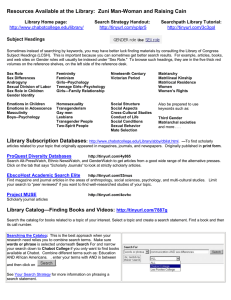
![2013 AP Physics 1st day power point curriculum night 2nd trimester[1].](http://s2.studylib.net/store/data/009829912_1-e1db909c08f2fa84c964bbb2e3dca121-300x300.png)
